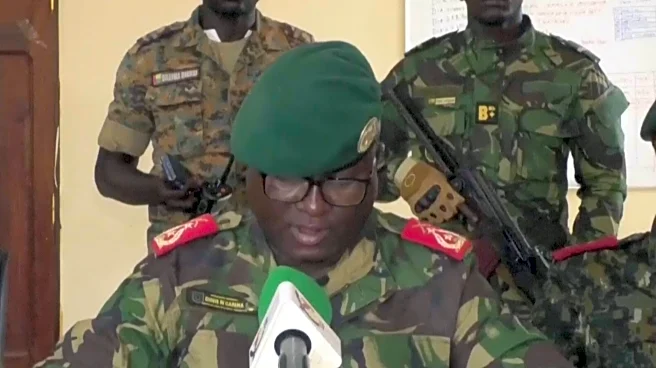LAGOS, Nigeria (AP) — Guinea-Bissau has joined a growing list of African countries where military officers have seized power since 2020.
A few hours after gunshots were heard near the presidential office on Wednesday, a group of military officers appeared on state television saying they had seized power. The deposed president, Umaro Sissoco Embaló, has been embroiled in fierce political battle with the opposition. Both sides claimed victory in a presidential election.
Embaló was arrested and detained after the coup was announced.
The small West African nation of 2.2 million on the Atlantic coast follows a pattern seen across the continent, with disputed elections, constitutional upheaval, youth discontent and military takeovers.
Here is a timeline of coups in Africa and the prospects of a return to democratic rule:
Since August 2020, Mali has witnessed two back-to-back coups. A group of soldiers mutinied and arrested senior military officers just outside the capital Bamako, after weeks of protests by civilians demanding the then-president, Ibrahim Keïta, resign over accusations of corruption and failing to clamp down on armed groups.
Col. Assimi Goita, the military leader, entered into a power-sharing deal with Bah Ndaw, a civilian president, with Goita serving as the vice president of a so-called transitional government. In 2021, Goita overthrew Ndaw following a series of disagreements and installed himself as president. He postponed an election slated for 2022 to 2077.
Mali is one of a tripartite group of landlocked West African countries, including Burkina Faso and Niger, run by military juntas that have now formed their own bloc after breaking from the Economic Community of West African states, and have firmly stated their objections to a return to democracy.
Following his father's death in 2021, Mahamat Idris Deby, an army general, quickly seized power, extending his family's three-decade rule of the central African nation.
Three years later, he delivered an election that he promised when he assumed power. Deby was declared the winner of the election, which the opposition claimed was rigged. He has since clamped down on critics. Former Prime Minister Succes Masra, an opposition figure, was sentenced to 20 years in prison earlier this year.
After 11 years in office, Alpha Conde was removed by a group of soldiers led by Mamady Doumbouya. In 2020, Conde had changed the constitution to allow himself to stand for a third term.
Doumbouya is running in the December polls and looks to shed his military fatigues, after a referendum this year allowed junta members to stand in elections and extended the presidential term limit from five to seven years.
The Sudanese military, led by Gen. Abdel-Fattah Burhan, staged a coup in October 2021, deposing Omar al-Bashir, who ruled the country for 26 years.
Burhan went on to share power with Muhammad Dangalo, known as Hedmeti, the leader of the paramilitary Rapid Support Forces.
In April 2023, a simmering feud between them led to one of the world's most catastrophic conflicts, according to the United Nations.
Like its neighbor Mali, Burkina Faso also witnessed two successive coups. In January 2022, Roch Kaboré was ousted by Lt. Col. Paul-Henri Damiba. In September, Cap. Ibrahim Traoré, the head of an artillery unit of the Burkina Faso's army, ousted Damiba on the same pretext as the earlier coup — deteriorating security.
Traoré had since ruled the country. In July, he dissolved the independent electoral commission.
Gen. Abdourahamane Tchiani ousted Mohamed Bazoum, ending a rare democratic transition in Niger. The dramatic coup sparked a crisis in the regional ECOWAS bloc, which threatened to invade Niger if Bazoum was not installed and the country returned to democracy. The crisis split the region, with Niger teaming with Burkina Faso and Mali to form a breakaway Alliance of Sahel States.
Shortly after President Ali Bongo, who had been in power for 14 years and had run for a third term, was declared the winner of another election in 2023, a group of soldiers appeared on television saying they were seizing power. They canceled the election and dissolved all state institutions.
Brice Oligui Nguema, a cousin of Bongo, took power and has since ruled Gabon. He was announced the winner of a presidential election in April.
Expressing their frustration over chronic water shortage and power outages, young people in Madagascar took to the streets to demand former President Andry Rajoelina’s resignation. Rajoelina instead dissolved his government and refused to resign, leading to a military takeover of the southern African country.
The West African nation has a history of coups. Embalo was seeking to be the first president to win a second term when the military seized power.















